#ecological apocalypse
Note
love your work and looking forward to the next chapter of WBITD!

girrrrl me too. she's so close to being ready to share.
As soon as I get off this wildfire I'll finish the last little bit of Ch.30 and post her. I can't post weekly during fire season so chapters are taking a little longer to edit/ share. I hiked 15 miles through burning terrain yesterday. The animals were leaving. I was heading into the belly of the beast 🔥👩🚒🥾
august has been wild.
pray for rain, people.
oregon burns.
12 notes
·
View notes
Text
Why We Need to Care About Insects
Originally posted on my website at https://rebeccalexa.com/why-we-need-to-care-about-insects/
Some months back a study was released that demonstrates just how damaging climate change is to insects, particularly those in tropical areas. Warming temperatures cause insects to die from overheating and dehydration, kills off their food sources, and lowers their fertility rates to dangerous levels. Moreover, changes in climate affect insect phenology, the timing of when they hatch, migrate, breed, and so forth.
And because insects are so small, they’re often disproportionately affected by many of these problems. As ectotherms, they rely on the air around them to regulate their body temperatures; their small mass means they lose heat faster than larger animals, and can be overloaded with heat much more quickly. Tropical insects are especially at risk from major fluctuations in temperature because they are adapted to a relatively narrow temperature range.
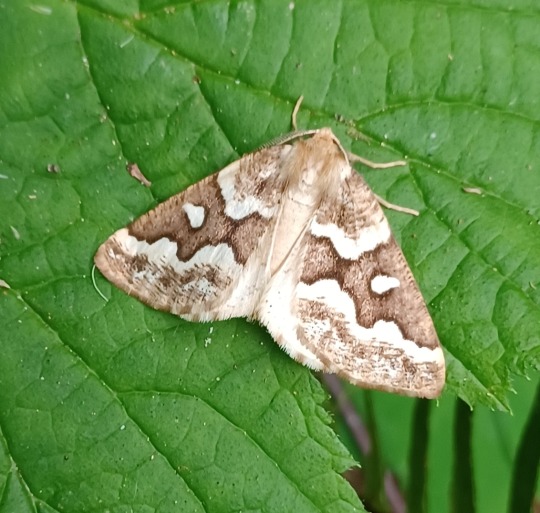
Gray spruce looper moth (Caripeta divisata)
But the problem goes far beyond the tropics, and we are in the middle of an insect apocalypse. This problem often flies under the radar of those who are not already aware of invertebrate conservation. While a few insects, such as monarch butterflies (Danaus plexippus) and domestic honey bees (Apis mellifera), find themselves in the press on a regular basis, most species don’t have large fan clubs. Some of my favorite insects include the white-tipped ctenucha moth (Ctenucha rubroscapus), the velvet snail-eating beetle (Scaphinotus velutinus), and the black-tailed bumblebee (Bombus melanopygus), none of which are insects you’re likely to find making the headlines.
To be fair, there are a lot of insect species out there, so it would be hard to feature every single one individually. But we already face the problem that many people simply just don’t see why we need to worry about fewer bugs around. Last year I wrote an article about how search engines tend to produce exterminator sites at the top of results for various insects, and while some of that is no doubt due to advertising-oriented algorithms, they do reflect a widespread demand for extermination services that isn’t matched by more positive attention to these little animals.
Much has been said among entomologists, ecologists, and other professionals about why we need to be concerned about the drastic drop in the numbers of many insect species, and I’ve written about it as well. I could reiterate what would happen if we lost our pollinators (and also how to save them!) or the crucial role insect detritivores play in reducing diseases and keeping the food web cycling along. And I am still a champion for mosquitoes and other unpopular insects.
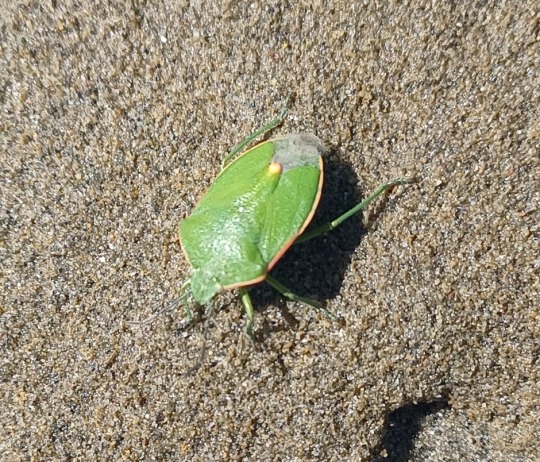
Green stink bug (Chinavia hilaris)
But these things always bear repeating. It may be that nine out of every ten organisms on this planet is an insect. Insects play an incredible number of ecological roles, from ecosystem engineers to pollinators to food sources and much more. Without them, ecosystems around the planet would collapse entirely.
I could certainly take the self-interested route and emphasize that fully one-third of our food relies on insects and other pollinators. I might also point out that insect detritivores help nourish the soil needed for everything from food crops to timber. While terrestrial insects and other arthropods only make up about a fifth of the amount of global biomass as their marine counterparts, they still represent a natural sink that holds about 200 million tons of carbon at any given time.
But our anthropocentric worldview rarely considers the intrinsic value of insects simply for existing. We’re constantly weighing and measuring their worth based on our biases and values. We divide them into “good” or “bad” insects: good insects are those that do things we like, like pollination or looking pretty, while bad insects are the ones that chew on our homes and plants or which bite or sting us when threatened or seeking food. For a lot of people, any insect beyond maybe a butterfly is a reason to say “Ewww, gross!” I’ve even seen this widespread among self-professed nature lovers, whether they have a true entemophobia or not, though there may be an evolutionary reason for this seemingly disproportionate reaction.
So consider this yet another attempt to change opinions about insects. I can’t cure entemophobia, but I can at least get people thinking more critically about personal and societal attitudes toward insects. I hope to get people to realize that widespread use of pesticides and other garden/agricultural chemicals–which has increased fifty-fold in twenty-five years–is driving the loss of so many insects. I’ve mentioned before that habitat loss is the single biggest cause of species endangerment and extinction, and that goes for insects, too. And, of course, the study mentioned at the start of this article is just one highlighting the increasing impact climate change has on insects worldwide.
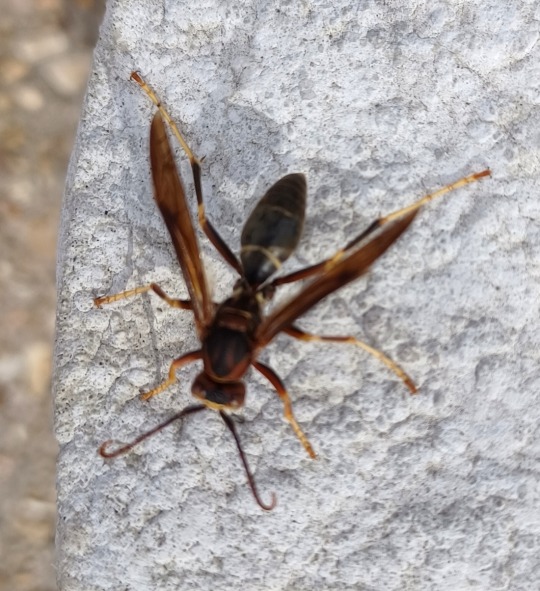
Metric Paper Wasp (Polistes metricus)
Let me wrap this up on a bright note: word is getting out. There is a lot more awareness than there was twenty years ago, and there’s more nuance than we had in the early “save the (domesticated European honey) bees” campaigns. More people are ditching pesticides and other garden chemicals unless absolutely needed, and regenerative agricultural practices that use fewer chemicals overall are gaining ground. And while numerous organizations are increasing awareness of insect conservation, the Xerces Society for Invertebrate Conservation–the oldest organization dedicated solely to invertebrates–is still going strong.
And you can help spread the word, too. Share this article with others, and some of the resources and organizations linked throughout. Consider your own relationship to the native insects in the world around you, and whether you might make their lives a little easier. And remember that sometimes it is the smallest of things that have the greatest importance in such a massive system as an entire living planet.
Did you enjoy this post? Consider taking one of my online foraging and natural history classes or hiring me for a guided nature tour, checking out my other articles, or picking up a paperback or ebook I’ve written! You can even buy me a coffee here!
#insects#CW insects#moth#beetle#wasp#bugs#invertebrates#insect apocalypse#climate change#environment#conservation#endangered species#extinction#sixth great extinction#wildlife#nature#animals#ecology#science#scicomm
152 notes
·
View notes
Text


100 tons of dead fish collected in a Greek town last week
#dead fish#athens#greece#fishing#ecology#natural disasters#collapse#climate change#global warming#ecosystem#rainforest collapse#destruction#self destruction#end of the world#conservation#extinction#doom and gloom#tipping point#apocalypse#catastrophic#climate catastrophe
11 notes
·
View notes
Text
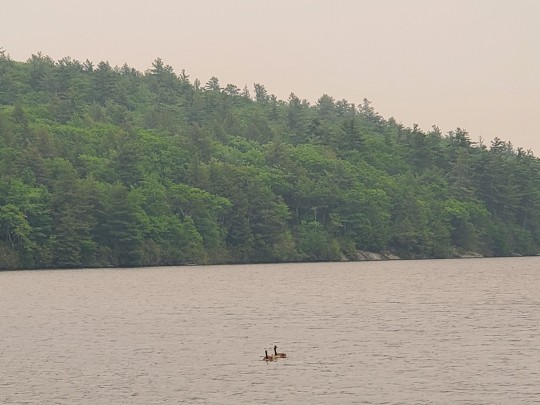

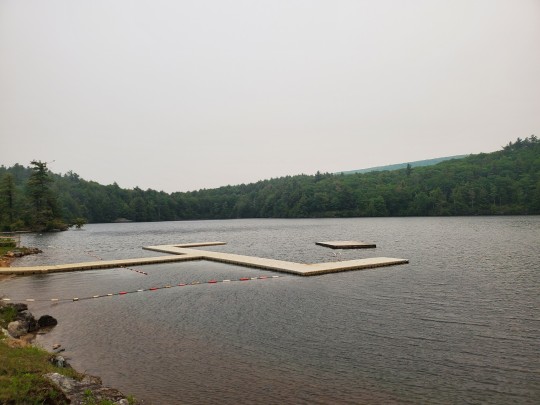
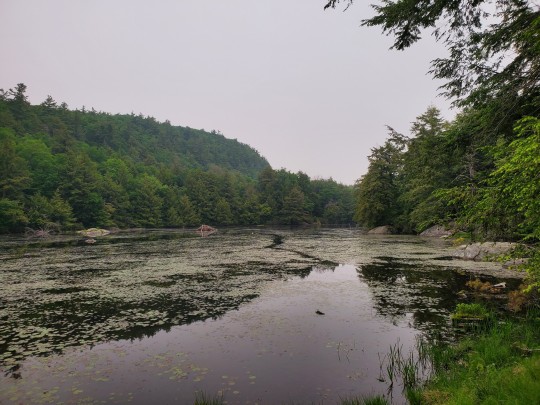
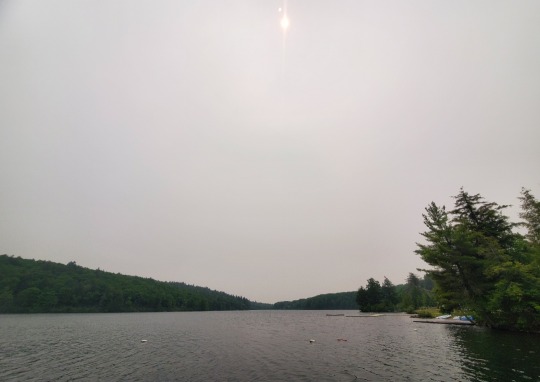

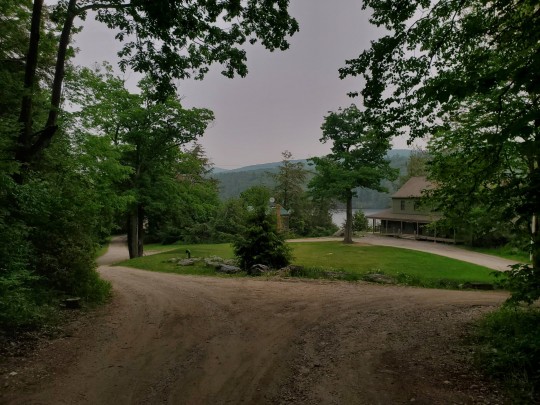


Yeah today was weird
For reference of what it normally looks like from a couple of days ago:
#photography#nature#wilderness#wilderness first responder#wfr#climate change#climate collapse#ecological collapse#ecology#wildfire#natural disaster#Massachusetts#new england#canada#nova scotia#quebec#fire#smoke#climate apocalypse#eco anarchism#anarchism
14 notes
·
View notes
Photo
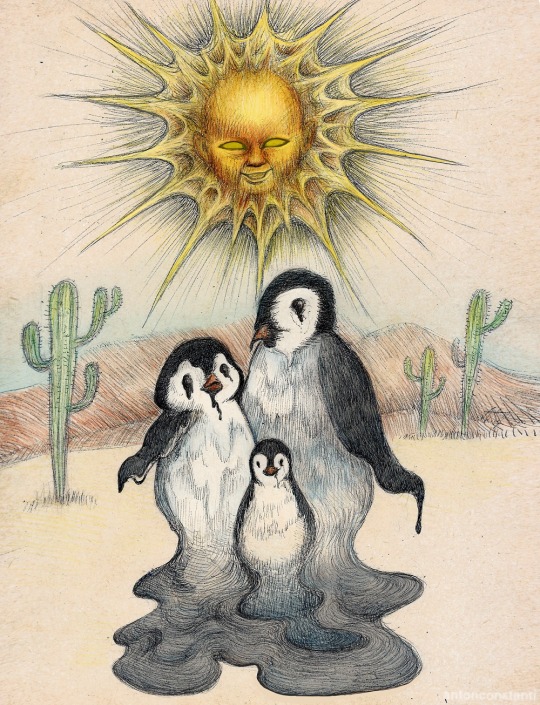
good morning sunshine
4 notes
·
View notes
Text

Watford, UK
6 notes
·
View notes
Text
— actually had a dream about a. a few nights back.. gratifying! even tho all my blorbo dreams are always presented from somewhat meta point of view: i either know for fact that i’m in a movie/show as the dream is being presented or watching said movie, or worse: i, h have to literally watch video essays in my sleep and it’s annoying sometimes… cmon brain give me fluffy nonsense (>\\\\<)
#critical approach ig…#💖 txt#i had several dreams where i assisted my fave du jour in a criminal investigation and it was SO FUN (but sucked how dream!me was sure it —#— all was just a movie shoot…)#this time though#i’ve seen a. in my dream on a breaking news report having sum the attributes of a ecological catastrophe apocalypse horseman figure ahh#this was very cool and all but my critical brain started making connections with the themes of inescapable rot from the green knight and#anyway this just goes to show. my brain is polluted by media consumption. still. pleas ples let me kiss that unstoppable force On The Mouth#🪙 it is written in the stars above
4 notes
·
View notes
Text

July 18, 2024:
Can't help the comparisons to Tender Is The Flesh, another nauseous book named for its meat industry. I think I liked this one better, but I can't remember how I rated TITF.
But really, this is more of a pathogen story, a plague, an airborne danger to both avoid and accept as an inevitable part of daily life. That's a familiar background anxiety, but the part about the child who cannot stop eating makes me so sad.
It's a short, frustrating book, and I don't want to examine why it was frustrating.
3.5/10
#WhatsKenyaReading
#whatskenyareading#books#reading#library#horror#pink slime#meat industry#meat#eating#weight#hungry#eating disoder trigger warning#tw eating issues#disordered eating mention#disordered eating cw#overeating#Prader-Willi syndrome#prader-willi#hyperphagia#polyphagia#disaster#apocalypse#ecological collapse
1 note
·
View note
Text
what WAS the normal child response to learning abt climate change actually. bc I’m pretty sure ‘depressed for at least 6 months and becoming deeply fascinated by apocalypses for ~3 years’ was prooooobably not it but who am I to say
#did NOT realise how much this has shaped me actually#also am not exaggerating when I say depressed I. cannot remmeber a lot of it but my parents were Worried about me#anyway I joke abt how I’m a biologist now bc of pokemon and that is very true but this is probably a pretty big chunk too#it’s just wild like that happened when I was 11 and I was DEEEEEP in the apocalypse trenches until I was at least 14#I think I wrote my first longish story when I was? 13? about waking up after some massive chunk of time to a world with no people left#that concept rlly held onto me for some reason. just all the people suddenly disappearing#I’m saying all this like I’m not still rlly into apocalypse stories but it is a mere shadow of its former self#anyway I’m so grateful for the conservation module I took this year bc learning abt the state of everything + the way out of it#scientifically instead of piecemeal from the news and the shit I could read abt. has been rlly good for my everything honestly#didn’t properly sink in until two months ago I don’t think that year this is kiiinda what I would like to do with my life#bc I’d always been resistant to the idea of doing conservation or climate science or anything bc historically thinking abt it for too long#has been BAD for me and I didn’t think I could do that forever while keeping most of me#but now I’m at a point where like. okay very likely I’m gonna be an actual scientist. and while pure science is cool and worthwhile#and I still have feelings abt how there’s no funding or anything for studies without immediate practical applications#(THEY NORMALLY COME LATER AND EVEN IF THEY DONT ITS WORTH KNOWING EVERYTHING WE CAN KNOW SHUT UUUUPPP)#i do wanna do smth that’s gonna make a difference bc like I’m kinda in a position where that’s possible here#anyway my masters is gonna be ecology and hopefully with a microclimate focus which is cool as hell and will hopefully keep stuff open a bit#and I’m gonna try do as much as I can next year. there’s some very cool stuff happening I might be able to join#anyway wow this took a turn#climate crisis! woo!!#luke.txt
1 note
·
View note
Text
Dave Neale, Matthew Dunstan : Echoes - L'Eclipse.
(Merci au Groupe d’Entraide Mutuelle Autisme de Tours pour son aide dans la conception de cet article)
On peut chercher des signes de l’effondrement global à venir. C’est ce que font, avec d’autres, les collapsologues. Mais la fiction met parfois aussi en scène les signes d’un effondrement global passé. Les deux perspectives se rejoignent d’ailleurs lorsqu’il s’agit d’utiliser une fiction afin…

View On WordPress
#AI#Apocalypse#Collapsofictions#Collapsologie#Ecologie#Ecology#IA#Intelligence Artificielle#Météorite#Science-fiction#sfff#Virus
0 notes
Text
today my wisdom is: the ecological crisis of our planet is not a thing that will Suddenly destroy us sometime in the next century—it has taken decades of continuous work for our biosphere to be preserved thus far, and it will take decades more of continuous work to continue preserving it.
The apocalypse is not a single event hovering in the future bearing down on us while we sit helplessly. We are at least 150 years into an ongoing "apocalypse."
Things will continue to steadily get worse without steady action, but "augh! it's already too late to stop climate change and mass extinctions!" is specifically the worst response
60K notes
·
View notes
Text
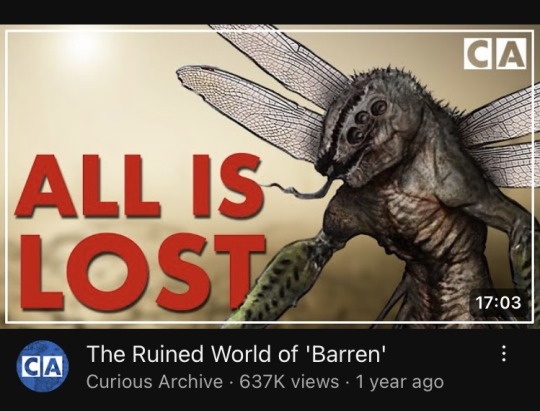
Here’s my personal recommendation of a YouTube video to check out:
youtube
#curious archive#post apocalypse#post apocalyptic#worldbuilding stuff#worldbuilding project#worldbuilding#speculative worldbuilding#alternate history#what if#retro#barren#not fallout#post apoc rp#tumblr recommendations#recommend#recommendation#speculative fiction#speculative biology#speculative evolution#speculative ecology#speculative zoology#speculative anatomy#specevo#spec evo#spec bio#spec zoo#youtube#youtube recommendations#youtube link#video link
0 notes
Text
If we did implement insects as environmentally sustainable alternatives to other protein sources like beef and pork, then how would that look in practicality? bc obviously cows and pigs are bred to be slaughtered in warehouses to provide food for people, so would the same apply to insects? and if that’s the case, could creating a market for ingestible insects help reverse the current insect apocalypse that’s happening rn by repopulating via artificial breeding and what not?? if so why are we not implementing it immediately
#like im sure ecologically speaking it would eventually create its own problems#esp as certain ‘flavors’ would get more popular and others would be less popular etc#but first things first: apocalypse!#my posts
0 notes
Text
youtube
#climate crisis#climate change#mushrooms#fungus#apocalypse#doomerism#climate doom#david graeber#capitalist realism#global warming#capitalism#youtube#uploads#strike#how to blow up a pipeline#climate activism#climate emergency#social ecology#fossil fuels#oil#oil industry#feminism#patriarchy#silvia federici#caliban and the witch#socialism#ecology#immigration#electorialism#general strike
1 note
·
View note
